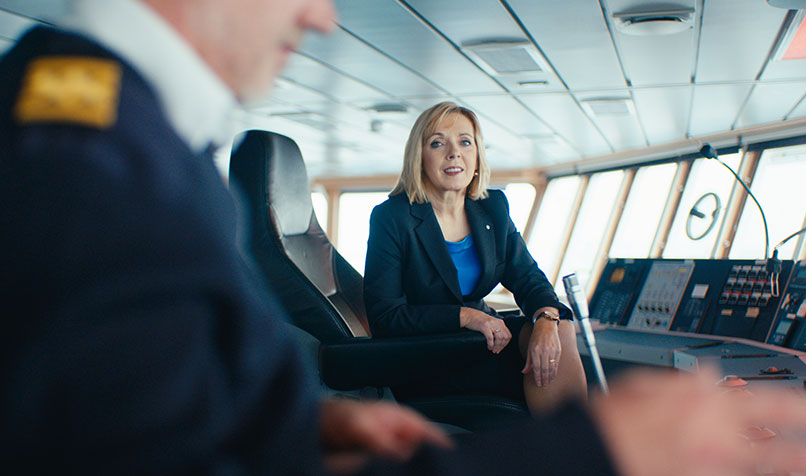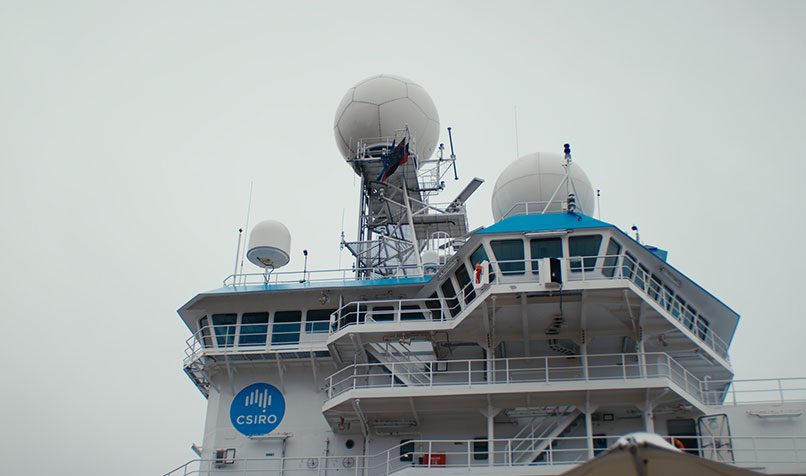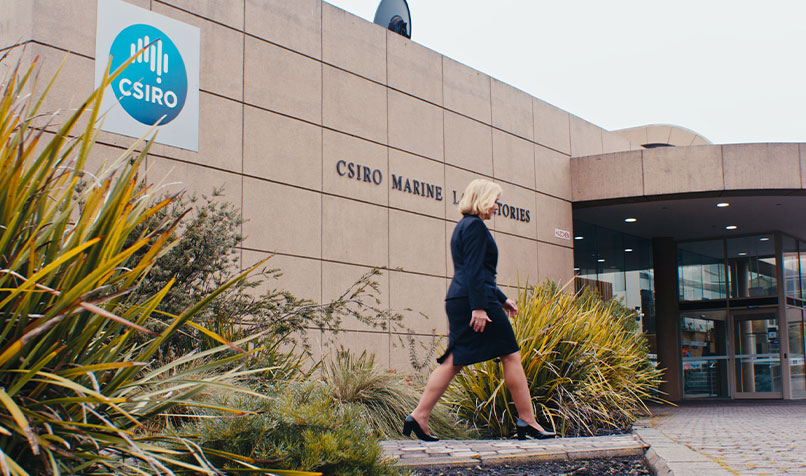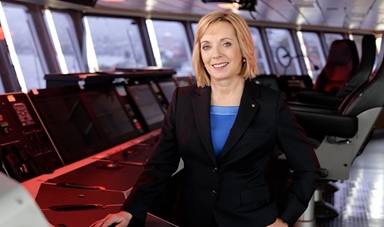Loading component...
At a glance
- Toni Moate FCPA began her career with CSIRO in 1991 and is now director of national collections and marine infrastructure.
- Moate takes a keen interest in scrutinising processes and embracing new technologies that can improve how those processes are run.
- Moate is also passionate about amplifying the role people play within processes and encouraging strong stakeholder relationships.
Toni Moate FCPA, CSIRO’s director of national collections and marine infrastructure, had a humble start to her public service career.
After leaving school in Year 10, Moate got a job as a clerk with the Tasmanian Department of Education. One of her tasks was coordinating the annual supply process for all the public schools across Tasmania. This involved keeping records and filling ledgers on paper, slowly and laboriously.
“It was a lengthy process to make sure the individual subject requests met the school’s budget,” says Moate. “When I was asked to manage that as a relatively junior person, I could immediately see a better way.
“The process of adding everything up was massive. I suggested that we might use this new thing called ‘Excel’. It would add everything up for us, rather than us having to transcribe figures into old ledger books. Many were against such new ideas and, in the end, I was only allowed to use Excel if I could find a way to print the tables out and glue them into the ledger books!”
This simple experience, and many that followed, had an important developmental effect on the young public servant. She realised she had a knack for looking at a system and figuring out how it might work better. Moate often improved, or completely redesigned, tasks she was given.
Soon, Moate was interested in doing more – in being someone who designs the machine, rather than being a small cog within it.
When she was 19, Moate enrolled in an associate diploma in business course and, five years of full-time work and part-time study later, she graduated with a major in accounting.
“I started at CSIRO in 1991, so took a year off studying to concentrate on the new job, but then went back to night-time study at the University of Tasmania as a mature student,” she says. “I did a commerce degree part-time for four years, and then went straight on to completing the CPA, so that I didn’t lose momentum.
“Along the way, I just embraced new opportunities. I loved them. I loved looking at a problem, thinking through the processes, embracing new technologies and figuring out how you could do it differently, more efficiently and more effectively. I think that is what has driven much of my career.”
Join the conversation
The biggest decision of all

Ironically, the role that has meant the most to Moate’s career so far was also the one she came closest to refusing. The decision-making process, she says, was one she’ll never forget.
Moate had been working in a relatively senior management position with the CSIRO, with the running of Australia’s largest blue-water research ship part of her portfolio. The ship was ageing and, under a government stimulus package, a budget of A$120 million became available to build a new, larger vessel, which would become known as the RV Investigator.
A project of this size and scope cannot be managed by just anyone, so an international search was mounted to find the right project director.
At one stage, one of the CSIRO’s most senior leaders asked Moate if she was disappointed that she wasn’t being invited to apply for the role.
“I said, ‘Oh no, absolutely not!’,” she smiles. “There’s just no way I could do that job.”
"I talk a lot about values and putting people first. I truly believe that, if you have a choice between task and relationship, you must always choose relationship."
The person chosen to lead the project was experienced marine engineer Graham Stacey.
“Graham was a traditional project manager. He was excellent technically and thought a lot about building a ship, but never gave much thought to the people side of things,” Moate says. “My goal for the project was not so much to build a ship, but to deliver blue-water research capability to our Australian researchers. So, I simply had a different lens.”
In the meantime, the organisation also quickly realised that the project required a second leadership role – an executive director to engage with government, the CSIRO board and other stakeholders, to decide on what equipment should be included on the Investigator, to dispose of the old ship and more.
“The project sponsor I’d been working with rang me on a Friday night, as I was about to go on leave,” Moate recalls. “He said, ‘Toni, I’ve just been asked why you are not doing this job’. I said, ‘I just don’t think I’m the right person’.”
However, she very quickly realised she’d made a terrible mistake and was missing out on one of the most amazing opportunities of her career.
“I was actually filled with a sense of grief,” Moate says. “I was about to lose something that had made me feel really alive for the past 18 months. Every week on the project something would happen that would remind me that I was completely outside my comfort zone. It would be a situation I’d never had to deal with before, and I loved it. I was grieving the loss of a great sense of purpose.”
She rang the project sponsor back, and just like that the job was hers.
CPA Library
Humanising the stakeholder process

Some leaders intentionally shy away from thorough stakeholder consultation, because often it can become a proverbial can of worms. With RV Investigator, Moate took the opposite approach.
She was managing the design and build of a ship that would be used by researchers and scientists for several decades. The only way to get it right, she decided, was to bring everybody into the conversation.
“The Investigator had a very large stakeholder community,” Moate says. “We exchanged over 3000 drawings, from a couple of pages to over 20 pages each. We had a shipbuilding team in Singapore, a coordinating point here in Hobart, and the entire Australian marine community engaged.
“I talk a lot about values and putting people first. I truly believe that, if you have a choice between task and relationship, you must always choose relationship. This was vital – the project was 24/7 for five years. Energy, commitment, passion and attention to detail were never negotiable.” With that many stakeholders, disagreements and difficult conversations were common.
"Family comes first. I have learned to plan a lot, to make sure that when there are important family things, they're in my diary very early, so I can avoid any clash."
Moate says the best way to handle such tense situations is to encourage people to remain respectful, to allow everybody to have their say, and to listen deeply to all sides of the argument. When people feel they have been heard, they will be a lot more receptive to a decision, even if it goes against their wishes.
“We had a budget of A$7.6 million for equipment,” Moate recalls. “We went out to the community and asked what they’d like to have on board. There must have been 100 items that people wanted, and many of those we couldn’t afford.”
Representatives from the various research communities scored each piece of equipment and, Moate says, at the beginning the assumption was that specific communities would vote only for their own needs.
“We asked everybody to present a little bit about their requirements, and it was really interesting,” she says. “There was one piece of gear, a marine gravity meter worth A$500,000, wanted by one of the geoscience communities. It was so expensive they assumed it would never be approved.
“But when they presented, the oceanographic community realised this gear was also able to measure the height of the ocean, which can be used to measure sea level rise over time.
As a result, it was funded and is on the ship now. That epitomised the value of the consultation process, of people parking their biases and being galvanised around a community goal.”
The cost of dedication

Moate admits that her investment in the project affected her personal relationships and her family members.
The five-year shipbuilding process took her away from her husband and two daughters a great deal. She flew to Singapore more than 20 times. At one stage, Moate admits, she made the mistake of buying her daughters two Jack Russell Terriers purely out of a sense of guilt. “I think that was probably one of my worst decisions,” she laughs. “But actually, we do love those dogs!
“One thing I always tell my team is that family comes first. I have learned to plan a lot, to make sure that when there are important family things, they’re in my diary very early, so I can avoid any clash.”
Moate also consciously prepares for family time, just as she would for a business meeting. She knows her goals – being fully present for her children, for example – and the things that might distract from those goals – such as her phone – and sets herself up for success in advance.
Over the years, Moate has learned to strike the right balance between wellbeing and work, becoming a better leader and public servant in the process. She has been honoured with awards including a place on the Queen’s Birthday Honours List and the title of Telstra Tasmanian Business Woman of the Year.
However, she is still chasing new challenges.
“A lot of recent career focus has been on the ship,” she says.
“But in my new role I’m now also responsible for six national research collections and 15 million specimens.
“We’re currently constructing a new building in Canberra, a A$70 million project, where we’ll store various specimens, including dead birds. When I first found out about the birds I just laughed and thought, goodness, how am I here? How have I gone from shipbuilding to storing dead birds? I’m not sure, but it all comes from great decisions, and I just love it.”

